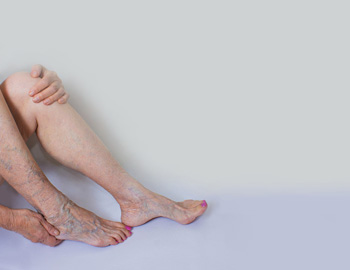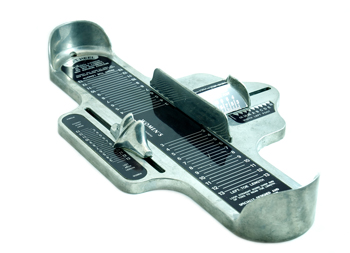 The medical condition that is known as neuropathy can affect the feet. Common symptoms patients experience may include a numbing or tingling sensation, and it is often difficult to feel existing cuts or bruises. People who are diabetic may be prone to developing neuropathy. It is beneficial for these patients to have regular foot examinations, refrain from walking barefoot outdoors, in addition to wearing shoes that fit correctly. Relief may be found when blood glucose levels are properly managed, and healthy eating habits are implemented. If you have symptoms of neuropathy, it is strongly advised that you are under the care of a podiatrist who can help you to begin the correct treatment plan.
The medical condition that is known as neuropathy can affect the feet. Common symptoms patients experience may include a numbing or tingling sensation, and it is often difficult to feel existing cuts or bruises. People who are diabetic may be prone to developing neuropathy. It is beneficial for these patients to have regular foot examinations, refrain from walking barefoot outdoors, in addition to wearing shoes that fit correctly. Relief may be found when blood glucose levels are properly managed, and healthy eating habits are implemented. If you have symptoms of neuropathy, it is strongly advised that you are under the care of a podiatrist who can help you to begin the correct treatment plan.
Neuropathy
Neuropathy can be a potentially serious condition, especially if it is left undiagnosed. If you have any concerns that you may be experiencing nerve loss in your feet, consult with Brent Harwood, DPM from Southeast Podiatry. Our doctor will assess your condition and provide you with quality foot and treatment for neuropathy.
What Is Neuropathy?
Neuropathy is a condition that leads to damage to the nerves in the body. Peripheral neuropathy, or neuropathy that affects your peripheral nervous system, usually occurs in the feet. Neuropathy can be triggered by a number of different causes. Such causes include diabetes, infections, cancers, disorders, and toxic substances.
Symptoms of Neuropathy Include:
Those with diabetes are at serious risk due to being unable to feel an ulcer on their feet. Diabetics usually also suffer from poor blood circulation. This can lead to the wound not healing, infections occurring, and the limb may have to be amputated.
Treatment
To treat neuropathy in the foot, podiatrists will first diagnose the cause of the neuropathy. Figuring out the underlying cause of the neuropathy will allow the podiatrist to prescribe the best treatment, whether it be caused by diabetes, toxic substance exposure, infection, etc. If the nerve has not died, then it’s possible that sensation may be able to return to the foot.
Pain medication may be issued for pain. Electrical nerve stimulation can be used to stimulate nerves. If the neuropathy is caused from pressure on the nerves, then surgery may be necessary.
If you have any questions, please feel free to contact one of our offices located in Fairhope, Brewton, and Atmore, AL . We offer the newest diagnostic and treatment technologies for all your foot care needs.
Read more about Neuropathy When purchasing shoes, it’s important to make sure you choose the correct size shoe by figuring out the accurate length and width of your foot. This can be found by measuring your foot at the end of the day when the feet are at their largest. It would also be beneficial to wear the same or similar socks while trying shoes on, as this may help to ensure a proper fit. Many shoe stores have a measuring tool that is known as a Brannock device, which can help to determine the correct size of your foot. Some patients prefer to stand on a piece of paper while tracing their feet. Both feet are rarely the same size, and it is suggested to use the size of the larger foot. It is beneficial to choose a style shoe that fits comfortably when tried on and to avoid shoes that have to be broken in. If you would like additional information about how to determine your correct shoe size, please consult with a podiatrist.
When purchasing shoes, it’s important to make sure you choose the correct size shoe by figuring out the accurate length and width of your foot. This can be found by measuring your foot at the end of the day when the feet are at their largest. It would also be beneficial to wear the same or similar socks while trying shoes on, as this may help to ensure a proper fit. Many shoe stores have a measuring tool that is known as a Brannock device, which can help to determine the correct size of your foot. Some patients prefer to stand on a piece of paper while tracing their feet. Both feet are rarely the same size, and it is suggested to use the size of the larger foot. It is beneficial to choose a style shoe that fits comfortably when tried on and to avoid shoes that have to be broken in. If you would like additional information about how to determine your correct shoe size, please consult with a podiatrist.
Getting the right shoe size is an important part of proper foot health. Seek the assistance of Brent Harwood, DPM from Southeast Podiatry. Our doctor will provide the care you need to keep you pain-free and on your feet.
Getting the Right Shoe Size
There are many people who wear shoes that are the incorrect size, negatively affecting their feet and posture. Selecting the right shoes is not a difficult process, so long as you keep several things in mind when it comes to choosing the right pair.
As our feet hold our body weight and keep us moving, it is important to treat them right. Picking the right pair of shoes can provide your feet comfort and mobility without pain.
If you have any questions, please feel free to contact one of our offices located in Fairhope, Brewton, and Atmore, AL . We offer the newest diagnostic and treatment technologies for all your foot care needs.
Read more about Getting the Right Shoe SizeThe condition that is known as an ingrown toenail can cause severe pain and discomfort. It occurs as a result of the side of the nail on the big toe growing into the outer edges of the skin. It can happen from trimming the nail incorrectly, or from wearing shoes that do not have ample room for the toes to move freely in. One of the first symptoms that is noticed can be slight swelling and redness on the side of the nail. If this is not treated promptly, it can become infected, and a discharge may ooze from the impacted area. Some patients have found mild relief when the foot is soaked in warm water. This may help the skin surrounding the ingrown toenail to soften, which may make it easier to gently pull the nail away from the skin. If you have developed an ingrown toenail, it is strongly suggested that you consult with a podiatrist who can perform the best treatment for this ailment.
Ingrown toenails may initially present themselves as a minor discomfort, but they may progress into an infection in the skin without proper treatment. For more information about ingrown toenails, contact Brent Harwood, DPM of Southeast Podiatry. Our doctor can provide the care you need to keep you pain-free and on your feet.
Ingrown Toenails
Ingrown toenails are caused when the corner or side of a toenail grows into the soft flesh surrounding it. They often result in redness, swelling, pain, and in some cases, infection. This condition typically affects the big toe and may recur if it is not treated properly.
Causes
You are more likely to develop an ingrown toenail if you are obese, have diabetes, arthritis, or have any fungal infection in your nails. Additionally, people who have foot or toe deformities are at a higher risk of developing an ingrown toenail.
Symptoms
Some symptoms of ingrown toenails are redness, swelling, and pain. In rare cases, there may be a yellowish drainage coming from the nail.
Treatment
Ignoring an ingrown toenail can have serious complications. Infections of the nail border can progress to a deeper soft-tissue infection, which can then turn into a bone infection. You should always speak with your podiatrist if you suspect you have an ingrown toenail, especially if you have diabetes or poor circulation.
If you have any questions, please feel free to contact one of our offices located in Fairhope, Brewton, and Atmore, AL . We offer the newest diagnostic and treatment technologies for all your foot care needs.
 When babies are born, their feet are flexible, and will gradually strengthen as they get older. During their first year, their feet will grow to approximately half of their adult foot size. As walking begins, it is beneficial to have your child walk barefoot while indoors. When the toes grasp the floor, the overall foot becomes stronger. When it is time for your child to walk outside, and the first shoes are purchased, there are important things to look for. The shoes need to be made with breathable materials, in addition to fitting properly with ample room for the toes to move freely in. Many parents observe their child’s walking patterns, as this can help to recognize potential problems. It is advised that you consult with a podiatrist who can provide useful information about your child’s feet.
When babies are born, their feet are flexible, and will gradually strengthen as they get older. During their first year, their feet will grow to approximately half of their adult foot size. As walking begins, it is beneficial to have your child walk barefoot while indoors. When the toes grasp the floor, the overall foot becomes stronger. When it is time for your child to walk outside, and the first shoes are purchased, there are important things to look for. The shoes need to be made with breathable materials, in addition to fitting properly with ample room for the toes to move freely in. Many parents observe their child’s walking patterns, as this can help to recognize potential problems. It is advised that you consult with a podiatrist who can provide useful information about your child’s feet.
Making sure that your children maintain good foot health is very important as they grow. If you have any questions, contact Brent Harwood, DPM of Southeast Podiatry. Our doctor can provide the care you need to keep you pain-free and on your feet.
Keeping Children's Feet Healthy
Having healthy feet during childhood can help prevent medical problems later in life, namely in the back and legs. As children grow, their feet require different types of care. Here are some things to consider...
Although babies do not walk yet, it is still very important to take care of their feet.
Avoid putting tight shoes or socks on his or her feet.
Allow the baby to stretch and kick his or her feet to feel comfortable.
As a toddler, kids are now on the move and begin to develop differently. At this age, toddlers are getting a feel for walking, so don’t be alarmed if your toddler is unsteady or ‘walks funny’.
As your child gets older, it is important to teach them how to take care of their feet.
Show them proper hygiene to prevent infections such as fungus.
Be watchful for any pain or injury.
Have all injuries checked by a doctor as soon as possible.
Comfortable, protective shoes should always be worn, especially at play.
If you have any questions please feel free to contact one of our offices located in Fairhope, Brewton, and Atmore, AL . We offer the newest diagnostic and treatment technologies for all your foot care needs.
Read more about What to Do to Keep Your Child’s Feet Healthy Foot pain is a common ailment among women who are pregnant, and it is triggered for several reasons. This type of pain often develops as a result from the added weight of the growing fetus, hormonal changes, and a possible change of foot structure. The arch may disappear, and this may enable the feet to roll inward. The plantar fascia can become inflamed, and it may be difficult to walk. This is a band of tissue that connects the heels to the toes, and is located on the sole of the foot. Weight gain can add pressure to the plantar fascia, and mild relief may be found when larger shoes are worn that can accommodate the expanding feet. Many pregnant women find it helpful to elevate their feet as often as possible during the day, in addition to limiting salt intake. If you would like additional information about changes in the feet that can occur during pregnancy, please consult with a podiatrist.
Foot pain is a common ailment among women who are pregnant, and it is triggered for several reasons. This type of pain often develops as a result from the added weight of the growing fetus, hormonal changes, and a possible change of foot structure. The arch may disappear, and this may enable the feet to roll inward. The plantar fascia can become inflamed, and it may be difficult to walk. This is a band of tissue that connects the heels to the toes, and is located on the sole of the foot. Weight gain can add pressure to the plantar fascia, and mild relief may be found when larger shoes are worn that can accommodate the expanding feet. Many pregnant women find it helpful to elevate their feet as often as possible during the day, in addition to limiting salt intake. If you would like additional information about changes in the feet that can occur during pregnancy, please consult with a podiatrist.
Pregnant women with swollen feet can be treated with a variety of different methods that are readily available. For more information about other cures for swollen feet during pregnancy, consult with Brent Harwood, DPM from Southeast Podiatry. Our doctor will attend to all of your foot care needs.
What Foot Problems Can Arise During Pregnancy?
One problem that can occur is overpronation, which occurs when the arch of the foot flattens and tends to roll inward. This can cause pain and discomfort in your heels while you’re walking or even just standing up, trying to support your baby.
Another problem is edema, or swelling in the extremities. This often affects the feet during pregnancy but tends to occur in the later stages.
How Can I Keep My Feet Healthy During Pregnancy?
If you have any questions please feel free to contact one of our offices located in Fairhope, Brewton, and Atmore, AL . We offer the newest diagnostic and treatment technologies for all your foot care needs.
Read more about Foot Care for Pregnant Women